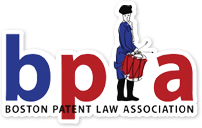
TTAB Proceedings Hosted by BPLA and Suffolk University Law School
By Marcya Betts, Juris Doctor/MBA Candidate 2017 and Samantha Cannon, Juris Doctor Candidate 2017
Poly-America v. Illinois Tool Works, Inc.
Illinois Tool Works, Inc. (“ITW”), a manufacturer of specialized industrial equipment and consumables, is the owner of three trademarks exhibiting a continuous reclosable strip. Two of the three marks reference color but do not claim color as a feature of the mark. In addition, two of the three marks display plastic film tubing attached to the reclosable strip. Poly-America, a manufacturer of plastic goods, including trash bags, sheets, and specialty film, petitioned to cancel ITW’s registration. The parties presented their oral arguments to a panel of three judges: Deputy Chief Judge Susan Richey, Peter Cataldo, and Thomas Shaw.
Claims Presented during Oral Arguments
The main issues presented in the oral arguments were the issues of standing and functionality. Poly-America addressed the issues of standing by discussing how the trademark would damage the company’s ability to enter and compete in the market for reclosable plastic bags. ITW argued that the trademark was incontestable, that the companies were not in the same market of goods, and that Poly-America waived its objection to the continued registration of ITW’s mark.
Poly-America claimed that ITW’s mark is functional. In particular, they referenced a patent for a bag closure mechanism as the basis for the cancellation. The description of the patent contained a reference to the use of color in a plastic bag, whose purpose was to “facilitate identification of the flange and assist in separation of the strips.” Under
Traffix Devices Inc. v. Marketing Displays Inc.
, 532 U.S. 23 (2001), a utility patent is strong evidence that the claims are functional. ITW argued that there was no consumer evidence that the bag was functional and the patents did not reflect functionality. In addition, ITW argued that the advertising showed the color line trademark served as an indicator of quality, that there were functionally equivalent design options for making the bags without the color, and that the color line is more costly and complex.
Administrative Judges Panel Discussion
Professor Loletta Darden of Suffolk University Law School moderated a question-and-answer session with Judges Peter Cataldo (TTAB), Thomas Shaw (TTAB), Justin Arbes (PTAB), and Robert Kinder (PTAB). The Judges addressed questions regarding the content of written briefs and oral arguments. With regard to briefs, the most effective are presented in a concise, logical order. The Judges do not want to jump around to find the answers they are looking for. Generally, advocates should lead with their best argument. Advocates should also address or at least recognize weaknesses in their case because if it is not on the record, the judges may assume that the advocate has conceded the point.
The Judges addressed several other common pitfalls. First, bare case citations without any explanation are not helpful. Advocates should address why the facts in the cited case are similar or different to their own case. Second, when drafting briefs, advocates should make sure that they cite to the proper authority (namely, e.g., TTAB, Federal Circuit, and Supreme Court cases) and that they are citing precedential case law.
For oral arguments, the Judges advised advocates to know the case and the record better than the Judges. Oral advocates should know their best evidence as well as the best evidence of their opponents. In the end, the responses of the advocates during oral argument may make or break the judge’s final decision.
The evening concluded with a Judges Reception.











